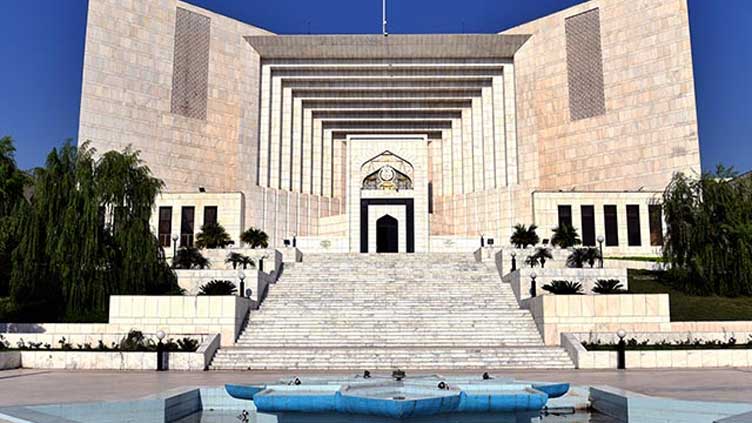SC turns down plea seeking full court for hearing military court trials

Pakistan
Not possible for the apex court to form a full bench before September
ISLAMABAD (Web Desk) - The Supreme Court on Wednesday rejected a fresh petition seeking formation of a full court to hear pleas challenging trial of civilians in military courts.
The apex court had reserved the judgement on Tuesday on the petition.
Chief Justice Umar Ata Bandial said judges were not available for the full court. "Some judges are on leave. A larger bench was constituted earlier by the court with available judges," he said. The CJP said it was not possible for the apex court to form a full bench before September.
Earlier on Tuesday, a six-member bench, headed by Chief Justice of Pakistan (CJP) Umar Ata Bandial, and comprising Justice Ijazul Ahsan, Justice Munib Akhtar, Justice Yahya Afridi, Justice Sayyed Mazahar Ali Akbar Naqvi, and Justice Ayesha Malik had reserved the judgement while hearing the identical petitions challenging the government's decision to conduct trials of civilians in military courts.
"[Court] will hold consultations on this matter now. [We] will inform about the opinion in 15 minutes if the consultations are completed," CJP Bandial said. He added that the decision would be announced tomorrow (Wednesday) if the consultations did not conclude.
Later, the CJP's associate intimated the parties that the verdict would be announced on Wednesday.
At the start of hearing on Tuesday, the CJP noted that senior counsel Faisal Siddiqui had petitioned the court a day earlier to form a full court to hear pleas against the military trial of civilians.
Justice Bandial then said that the bench would first hear the arguments of the lawyer of ex-CJP Jawwad S Khawaja, one of the petitioners.
“My client is the former chief justice of Pakistan,” Advocate Khwaja Hussain Ahmed said. “My client wants the court to treat me like a common citizen, not a special person. He wants ex-chief justice to be removed from his name.”
Here, Justice Bandial said that the former chief justice was a prominent personality and his petition was “apolitical”. At one point, the apex court judge also asked if Faisal Siddiqi was hiding, to which he was told that the counsel was outside the courtroom for some work and would return soon.
As the hearing continued, Justice Naqvi said the law didn’t give permission to “pick and choose”, asking why the inquiry [against civilians in military courts] was not brought on record.
The AGP said a lot of caution was exercised during the arrests. “Only people directly involved were sent to military courts. Those who entered the Lahore Corps Commander’s residence had been sent to military courts.”
However, Justice Bandial remarked that Awan’s claim could be proven if there was content on the trials available at any forum. The AGP said the court had questions regarding why the remaining suspects, arrested for May 9 violence, were let go. “A lot of people were involved but arrests were made inlight of evidence.”
Justice Naqvi again asked why an inquiry, if conducted, was not brought on record. Awan claimed the inquiry was present. “This means that the government will conduct a court martial of the 102 people arrested,” the top judge remarked. Awan said a report on 102 suspects facing military trials had been submitted in the Supreme Court.
He also provided a breakdown of arrests made following the May 9 violence. According to it, seven people were in custody for breaking into the General Headquarters in Rawalpindi, four suspects attacked the army institute, 28 suspects attacked the Lahore Corps Commander’s residence, 15 people were involved in attacks on army garrisons in Multan and Gujranwala, eight suspects attacked an ISI office in Faisalabad while five were involved in the attack on the PAF Air Base in Mianwali.
He said 14 people were involved in attack on Chakdara gateway while seven attacked the Punjab Regiment Centre in Mardan. Moreover, 13 suspects were taken into custody for attacks on army garrisons in Abbottabad and Bannu. “All these people were arrested on the basis of CCTV footage and other evidence,” Awan added.
Addressing to AGP the CJP said, “It looks like you aren’t fully prepared to answer these questions. We have to look at the constitutionality of the matter.” The CJP stated that some judges had refused to be a part of the bench and asked how could a full court be formed in such circumstances.
Meanwhile, Justice Naqvi asked if other petitioners in the case were of a similar point of view after which Aitzaz Ahsan came to the rostrum. “This is very strange for me that formation of the bench is being challenged at this late stage of the case,” he said. “We have faced jails for the honour of the apex court.”
Ahsan asserted that he had “complete confidence” in the current bench, recalling that the court had included all available judges to the bench. “After the departure of two judges, this is a full court of sorts,” he said. He demanded that 102 people in military custody should be handed over into judicial custody.
After hearing the arguments, the court reserved its verdict on Siddiqui’s petition regarding the constitution of a full court bench.

